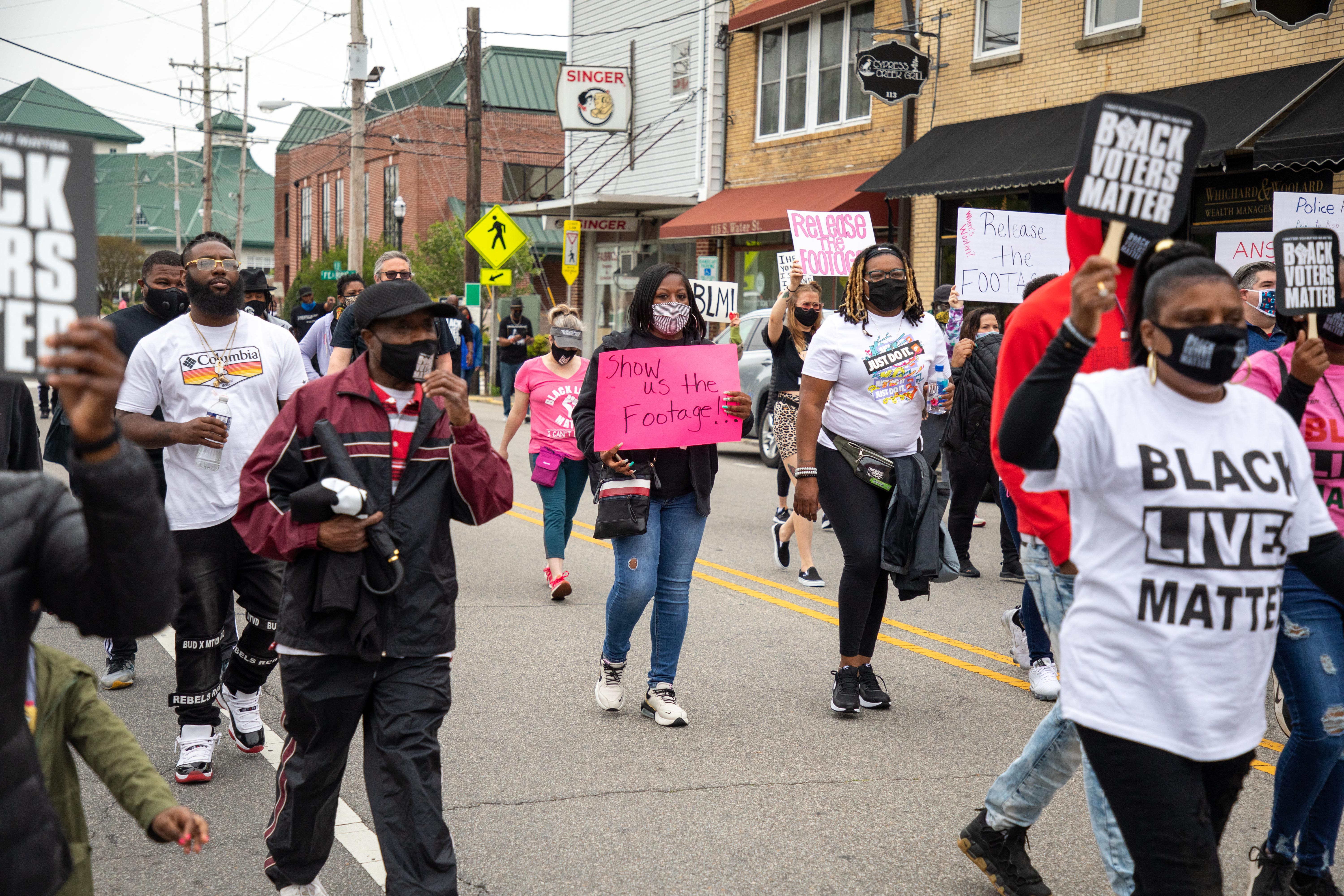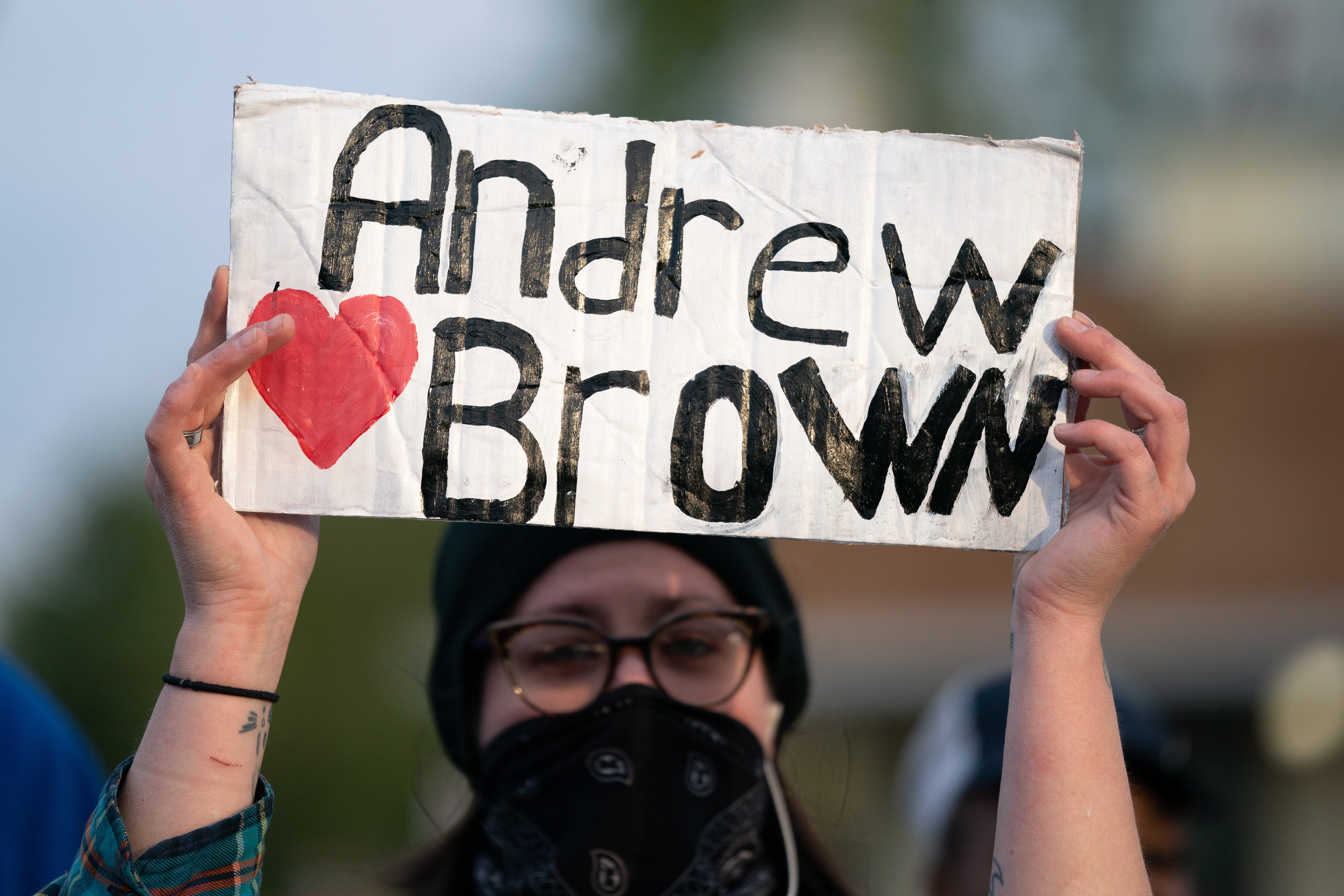Andrew Brown: Here’s everything we know about the fatal police shooting in North Carolina
It came barely a week after the police killing of Daunte Wright
Your support helps us to tell the story
This election is still a dead heat, according to most polls. In a fight with such wafer-thin margins, we need reporters on the ground talking to the people Trump and Harris are courting. Your support allows us to keep sending journalists to the story.
The Independent is trusted by 27 million Americans from across the entire political spectrum every month. Unlike many other quality news outlets, we choose not to lock you out of our reporting and analysis with paywalls. But quality journalism must still be paid for.
Help us keep bring these critical stories to light. Your support makes all the difference.
Just over a week after police killed Daunte Wright in Minneapolis, sheriff’s deputies in Elizabeth City, North Carolina, killed yet another Black man, 42-year-old Andrew Brown, Jr. Here’s what we know about this latest police killing, which has inspired days of protests and captured national attention.
What happened to Andrew Brown?
A group of Pasquotank County sheriff’s deputies shot and killed Mr Brown outside his house last Wednesday, 21 April, in Elizabeth City as they attempted to serve him with an arrest and search warrant, according to the sheriff’s office. Witnesses say police shot Mr Brown as he was driving away from officers.
After a private viewing on Monday morning, Mr Brown’s family told reporters that a limited section of police body camera video shows seven or eight officers, including some armed with assault rifles, firing a hail of bullets at Mr Brown, who keeps his hands on the wheel of his car and complies with officers’ commands. The family’s attorneys have argued there’s more to they incident they don’t yet know.
“As my eight-year-old daughter would understand, they are trying to hide something,” civil rights attorney Ben Crump, who is representing the Brown family, said on Monday. “They don’t want us to see everything.”
One of Mr Brown’s neighbors, Demetria Williams, told theNews & Observer she counted at least 14 bullet shell casings on ground.
“This is an arrest surrounding felony drug charges,” Pasquotank Chief Deputy Daniel Fogg said in a video statement following the incident. “Mr. Brown was a convicted felon with a history of resisting arrest. Our training and our policies indicate under such circumstances, there is a high risk of danger.”
Is their sufficient body camera footage to tell what happened?
Despite being played a “snippet,” as they put it, of body camera footage earlier this week, Mr Brown’s family says local officials have slow-walked the release of the the full video account of what happened, which they believe to be substantial given the number of officers on the scene.
So far there are two main video sources whose contents have reached the public.
On Tuesday, newly obtained video showed the moment last week when sheriff’s deputies arrived on the scene and proceeded to shoot Mr Brown. In the footage, obtained by Virginia-based TV station WAVY via a Freedom of Information Act Request, a truck full of deputies in body armor drive past a city security camera on their way to serve Mr Brown with an arrest and search warrant as part of a drug investigation.
They pull up to a stop at the outer edge of the video frame, and can be heard yelling, likely at Mr Brown, before the audio cuts out during the moments where he was believed to be shot just offscreen.
“The video leaked earlier today shows what we already suspected: Andrew Brown Jr. was brought down by an inflamed modern-day lynch mob,” Mr Brown’s attorneys said in a statement.
Mr Brown’s family also watched a selection of body camera video earlier this week, though Pasquotank County Attorney R Michael Cox declined to show Mr Brown’s relatives any more than 20 seconds from a single police body camera, according to former congressman and political analyst Bakari Sellers, who is assisting the Brown family.
“I’ve never been talked to like I was talked to in there,” Mr Sellers said. “Mr Cox told me, a grown Black man, that he was ‘not f***ing going to be bullied,’” he added.
Pasquotank sheriff Tommy Wooten said he supports releasing the footage and full transparency, but Mr Brown’s family was furious with how the case has been handled so far.
“Twenty seconds is not transparency when you got multiple officers gunning down a man with his hands on the steering wheel trying to get away,” family attorney Chantel Lassiter said at a press conference after reviewing the footage on Monday. “We will have justice.”
The Brown family’s lawyers alleged that shooting appears to begin before the clip they were played, so they can’t tell what really happened.
Prior to showing the family the footage, county attorney Cox said in a statement that officials had delayed releasing the video to blur out faces so as to protect sensitive details in an active investigation.
“The law also allows us to blur some faces on the video and that process takes time,” he said. “This may be done when necessary to protect an active internal investigation. As soon as these redactions are complete, we will allow the family to view this footage.”
The Independent has reached out to sheriff Wooten and attorney Cox for comment.
Sheriff Wooten has said under North Carolina law a judge makes the final decision to release police body camera footage, a process which often takes days or weeks.
How did Andrew Brown die?
Mr Brown was shot at least four times in the right arm from bullets that came from in front of him, as well as shot from behind, according to a private autopsy Mr Brown’s family commissioned.
“We commissioned a private individual autopsy report because we don’t have access to anything that’s official,” attorney Wayne Kendall said on Tuesday. “And what our preliminary autopsy report show is that there were five penetrating bullet wounds to the body of Andrew Brown Jr.”

Who was Andrew Brown in life?
According to friends and family, Mr Brown, a father of seven, was known for his easygoing charm despite living a tough life.
His mother was killed in Florida when he was young, and his father resided in federal prison. Mr Brown dropped out of high school himself and had a number of criminal and drug charges since the 1990s, but always encouraged his children to finish school.
Mr Brown, who went by “Drew,” was partially paralyzed from an accidental shooting, and lost an eye in a stabbing. Despite these setbacks, Mr. Brown had a reputation as an entertaining storyteller
“He had a good laugh, a nice smile. And he had good dimples,” his aunt Glenda Brown Thomas told the AP. “You know, when he’s talking and smiling, his dimples would always show. And he was kind of like a comedian. He always had a nice joke.”
Why were police there in the first place?
A police drug task force had been watching Mr Brown for more than a year, WAVY reported, and officers searched his home the morning he was killed. The warrants they were serving him last Wednesday morning were reportedly based on information from an informant, as well as clandestine recordings of drug buys, according to court documents.
Mr Brown’s family said they were told no drugs or weapons had been recovered from his home or his car during searches.

How has the community reacted to the shooting?
Community protests have continued each day since Mr Brown was killed. City officials declared a state of emergency on Monday ahead of the expected public release of the body camera footage, citing worries over a “period of civil unrest within the city.” The footage has still not surfaced.
The killing comes as the nation is already weary with seemingly daily headlines of police killing Black people, with officers rarely facing criminal charges, except for the notable exception of the recent Derek Chauvin verdict in Minneapolis.
“One body cam, 20 seconds and an execution - and so with all due respect, I know there were a lot of people who thought last week’s verdict was justice,” Mr Sellers, the attorney, said on Monday. “And I told you then it wasn’t justice because we still can’t get justice and accountability today.”
What happens next?
Seven deputies involved in the incident have been placed on paid administrative leave, and the North Carolina State Bureau of Investigation has taken over investigating the case.
Sheriff Wooten called for patience as the investigation continues, and vowed to punish any officers accused of wrongdoing
"If any of my deputies broke any laws or violated any policies that come out through this investigation, they will be held accountable," he said.
Subscribe to Independent Premium to bookmark this article
Want to bookmark your favourite articles and stories to read or reference later? Start your Independent Premium subscription today.




Join our commenting forum
Join thought-provoking conversations, follow other Independent readers and see their replies
Comments